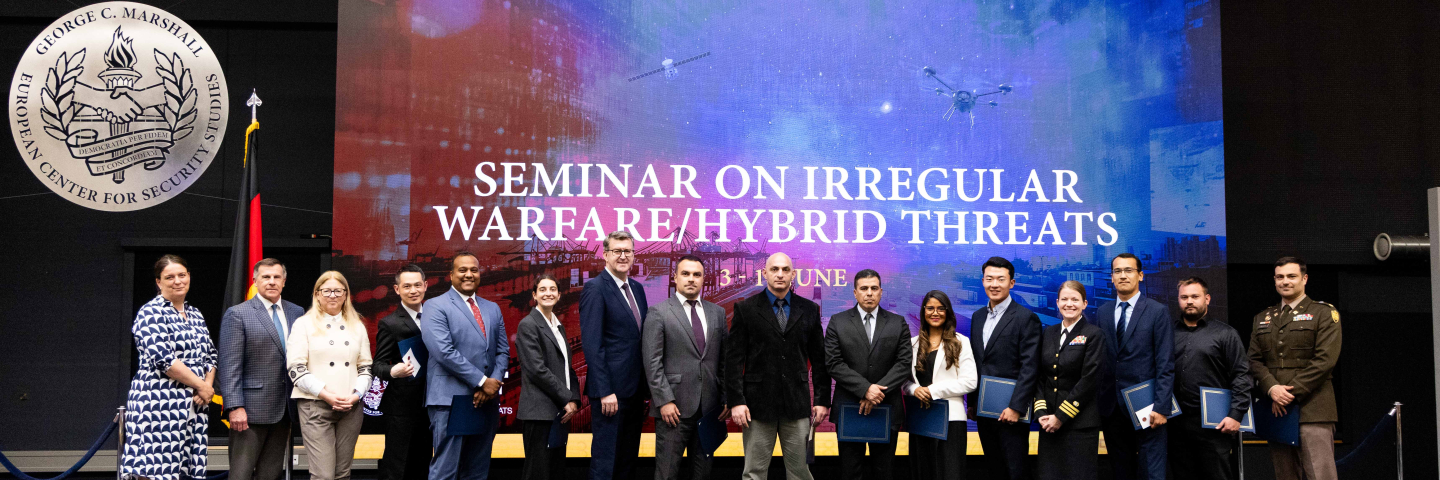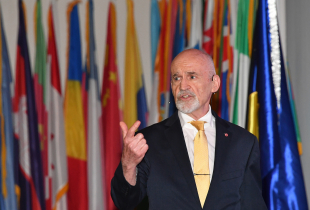
Marshall Center Seminar Prepares Global Leaders to Counter Hybrid Threats
The Marshall Center concluded its Seminar on Irregular Warfare/Hybrid Threats (SIWHT) June 18, 2025, following three weeks of hands-on learning to understand how to counter the growing challenges of hybrid threats.
SIWHT brought together 90 international security professionals from 66 countries to examine how state and non-state actors use cyber operations, disinformation, economic coercion, and legal manipulation to undermine institutions and destabilize societies without triggering conventional conflict.
“This is about our ability to function. Our societies are under pressure and must be able to recover quickly when these actions occur,” said NATO Assistant Secretary General Jean Charles Ellermann-Kingombe, SIWHT keynote speaker. “For years, we’ve recognized the security gaps we face. Now, urgent work is needed to address complex challenges.”
Through lectures, panels, and practical exercises, participants explored how hybrid threats blur boundaries between war and peace and how nations can better integrate response planning. The group travelled on a field trip to Munich to engage with public and private institutions addressing these issues as well.
The course included a maritime tabletop exercise led by the Centre of Excellence for Operations in Confined and Shallow Waters.
“What I like about the tabletop exercise is that it forces everyone out of their usual roles. Military participants take on diplomatic functions, and vice versa. It helps us understand that every perspective contributes to the overall response,” said Hendrik Phillips, a course participant and export sales manager at Airbus Defence and Space. “You also see how countries approach the same challenge in different, but equally valid ways. That cross-functional and cross-cultural exchange is where real learning happens.”
On the final day, participants reflected on how the course content and connections will support their future work–many valuing the exchange of perspectives across agencies, countries, and professional backgrounds.
“This seminar was a wake-up call. I knew a lot before coming in, but this really opened my eyes. It made me realize just how serious the challenges are. We are in a lot of trouble, and it’s time to do something,” said Lt. Col. Vojislav Pejović, with the Armed Forces of Montenegro. “It was helpful to not just focus on threats, but on the alliances and networks that help us withstand them. I’m going back with knowledge I can share with colleagues. And when the opportunity comes, I’ll be ready to apply it.”
In his closing remarks, Marshall Center U.S. Deputy Director Timothy McAteer emphasized how the course content was intended to help leaders confront the challenges ahead.
“This course was intentionally designed to push the boundaries of your understanding and challenge your assumptions. You didn’t just study these threats. You worked through them in practice,” he said. “Our goal wasn’t just to teach concepts, but to strengthen your ability to lead through uncertainty.”
SIWHT underscored the need to align strategy with values, protect critical infrastructure, and leverage public-private partnerships. It also highlighted the need to act decisively across all domains and apply a whole-of-society response to threats that evolve below the threshold of armed conflict.
Graduates of SIWHT now join the Marshall Center’s global alumni community of more than 16,000 professionals from over 160 countries, enhancing national security efforts and supporting lasting collaboration among trusted partners.
“What makes this course different is that it’s not just about knowledge. It’s about community,” said May-Britt Stumbaum, Ph.D. habil., SIWHT course director. “You are now part of a network that will be there for you when the next crisis hits — people who will support you, who will have your back. That trust doesn’t end here. It starts here.”
